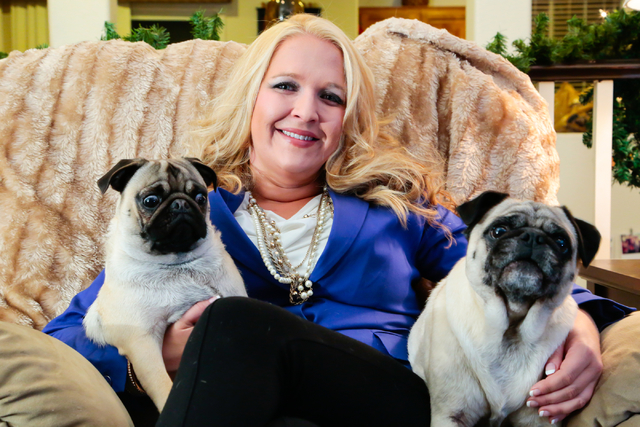Spouses tangle over pets in divorce court
Family law attorney Mandy McKellar valued her cats so much that she included them in a prenuptial agreement with her husband — “just in case.”
By the time they divorced this summer, the couple also had acquired two dogs. Now all five pets live with McKellar in her Las Vegas home, although she has offered to let her ex-husband take the cat they adopted.
“He can come back and get her at any time,” McKellar said of the cat. “She hates the dogs.”
Although McKellar and her husband went through an uncontested divorce, lawyers and judges who handle Family Court cases know that breakups often turn bitter. Couples fight over their children, their houses, and yes, even their pets.
The American Academy of Matrimonial Lawyers announced in February that 27 percent of the respondents in a recent survey had noticed an increase in the number of couples who fought over custody of a pet during the previous five years. Most of the time, those disputes involved a dog.
“There’s no law on it,” said Cynthia “Dianne” Steel, a veteran judge in Clark County Family Court. “There’s no custody law.”
Family law attorney Stacy Rocheleau said pets are considered property by courts in all states.
“To the owner, it’s really not,” she said. “To the owner, it’s a family member.”
Disputes over custody of family pets pose difficult problems for courts in divorce cases, according to a recent blog by Brett Turner, a senior attorney with the National Legal Research Group.
“Courts are often asked to treat pets as they treat children, awarding custody and visitation rights,” he wrote. “But such treatment would make divorce cases harder to resolve, and supervising pet visitation rights would be a material burden upon judges.”
Rocheleau advises couples to have a written agreement regarding pet ownership, such as the one the McKellars had.
“Anything that you care about, put it in a prenup,” she said.
Rocheleau also reminds clients that “possession is nine-tenths of the law.”
“If you really want that pet, you better take it when you leave,” the attorney advises.
Both Rocheleau and McKellar have written articles on the issue of divorce litigation involving pets.
McKellar’s article appeared in Nevada Lawyer magazine in 2008. She recalls that she was dealing with a particularly nasty custody dispute at the time involving “Daisy the Rhodesian Ridgeback rescue hound.”
The divorcing couple had no children, McKellar said, but “they were fighting tooth and nail over that dog.”
Family Court Judge Sandra Pomrenze ruled that whichever spouse was awarded the house also get the dog.
McKellar, who represented the wife, said the husband initially was awarded the house — and Daisy.
When McKellar and her client went to retrieve items from the house, however, they discovered that the husband had gutted it. He had left with everything in the home, including the dog.
The case went back to court, and Pomrenze ordered the husband to return everything to the house. McKellar said her client eventually obtained custody of Daisy.
Steel and another veteran judge in Clark County Family Court, Gloria O’Malley, said they rarely see custody battles over pets.
“I would much prefer they reach their own agreements,” O’Malley said.
O’Malley remembers handling a divorce several years ago that involved a dispute over a dog.
“They agreed on custody of the children, but they couldn’t agree who would get the dog,” the judge said.
O’Malley said she ended up ordering the family pet to go back and forth, with the couple’s children, between the two households.
“I just thought it would help the children emotionally,” she said.
O’Malley said the dog served as a “common denominator” for the children — “something that would bind them to both houses equally.”
“I never do that with cats, obviously,” the judge added. “They don’t travel well.”
O’Malley recalls handling one contested custody case involving a cat. She said she awarded the cat to the spouse who brought the pet to the marriage and who also served as its primary caretaker.
Steel said she never has had to make a decision in a pet custody case.
“I know it happens, and I know that judges do consider the emotional attachment to pets,” the judge said.
She said couples in her courtroom usually reach an agreement about where their pets will go. That happened in a divorce case, which is still pending before her, in which both spouses had strong emotional ties to their dog.
Steel described the pet as old, frail and “just like a family member.”
“They both negotiated and worked together so that the dog would be comfortable,” the judge said.
Steel said one change in family law that involved pets occurred in 2007, when the state Senate enacted a bill that allowed the courts to consider the abuse of animals in domestic violence cases. McKellar wrote about the revised law in her 2008 article.
“Basically, the Senate determined that it was all too common for a domestic abuser to terrorize and control family members by torturing and even killing the family pet,” the lawyer wrote.
Under the amended law, according to McKellar’s article, the intentional injuring or killing of an animal is a violation of a temporary protective order and requires further criminal prosecution.
The amended law also prohibits ownership or possession of the animal by the person who harmed it.
“In other words, if you beat your pet, you cannot have custody of him,” McKellar wrote.
“These legislative changes are possible examples of how the law is evolving to ensure animals are not treated as mere pieces of property.”
Rocheleau said she has noticed such a trend.
In one divorce case she handled earlier this year, the couple had two dogs, but both spouses wanted custody of the same one. The husband had purchased the dog with community money, Rocheleau said, but the wife claimed he had given it to her as a gift.
When they couldn’t reach an agreement, Judge Cheryl Moss decided to hear testimony to help her decide who owned the pet.
“She didn’t have to do that,” Rocheleau said.
Moss ultimately awarded custody to the wife, who was moving to Texas, and Rocheleau said her client, the husband, was “horribly upset.” The couple have no children.
Rocheleau, like O’Malley, said couples should do their best to resolve disputes over pet custody and support on their own.
“The judge doesn’t care about the dog or the cat like you guys care about the dog or the cat,” she tells couples. And judges “would rather deal with more substantive issues,” the lawyer added.
Contact Carri Geer Thevenot at cgeer@reviewjournal.com or 702-384-8710. Follow @CarriGeer on Twitter.
AROUND THE WEB
Do we treat dogs the same way as children in our modern families? (Psychology Today, 2011)
Do you consider pets family members? (blogpaws, 2013)
How we treat pets in America (priceonomics, 2013)



















